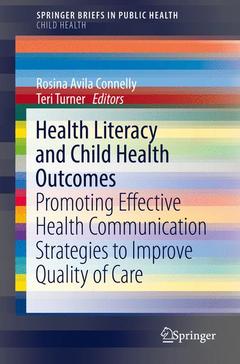Health Literacy and Child Health Outcomes, 1st ed. 2017 Promoting Effective Health Communication Strategies to Improve Quality of Care SpringerBriefs in Child Health Series
Coordonnateurs : Connelly Rosina Avila, Turner Teri

This compact resource presents current data on health literacy as it affects child health outcomes, with a sharp focus on improving communication between healthcare providers and pediatric patients and their families. A frequently overlooked social determinant of health in children, health literacy is shown as a critical skill for patients and families and a key aspect of patient engagement. The authors? evidence-based survey pinpoints common problems in healthcare providers? verbal and written communication with pediatric patients, their parents, and/or caregivers. Readers will learn about practical health literacy strategies for addressing and preventing miscommunication at the individual and systems levels. These improvements are linked to immediate results (e.g., greater compliance, fewer medication errors) as well as improved long-term child health outcomes, including reduced health disparities and enhanced quality of life into adulthood.
This transformative guide:
- Defines optimum health communication as necessary for working with all patients
- Identifies common barriers to clear health communication
- Traces the relationship between health literacy and child health outcomes, from the prenatal period and into young adulthood
- Offers guidelines for creating effective patient education materials and a safe, health literacy oriented patient-centered environment
- Integrates health literacy into health systems? quality improvement plans
Health Literacy and Child Health Outcomes informs students in MPH programs as well as public health scientists and scholars, and can also serve as an introductory text for students in public health ethics or a general applied ethics course. Public health professionals in diverse contexts such as local health departments and nonprofit organizations will appreciate its robust approach to ethical practice, professional development, and systems improvement. This will be a helpful guide for introducing health communication topics in medical education and allied health. Lastly, clinicians taking care of pediatric patients will find concise information and practical advice to apply in the clinical setting.
- Health literacy
- English language proficiency and cultural competency
- How big of a problem?
- How to know who is at risk?
- Avoiding medical jargon
- Checking for understanding: Teach Back and Show-Me techniques
- Limiting amount of information and repeat
- Encouraging patients to ask questions: Ask Me 3
- Using pictures or models
- Using patient information materials effectively
- Will patients feel welcome and encouraged to ask questions?
- The patient-centered approach to communication
- Ensuring patient understanding of medication instructions: dosing instruments, medication charts, and other tips
- Undergraduate medical education
- Graduate medical education
- Continuing medical education
- Maintenance of board certification (MOC)
Offers up-to-date information on health literacy as it affects children’s health for students, residents, and practitioners
Reviews in-depth topical areas that are relevant for doctor-patient relationships, understanding of medical information, medical error reduction, patient safety, compliance with medical instructions, quality of care, and patient satisfaction
Seeks to improve the quality of care practitioners deliver to pediatric patients by facilitating patient understanding of medical information, thus increasing patient compliance and patient satisfaction and decreasing miscommunication and medication errors
Includes supplementary material: sn.pub/extras
Date de parution : 04-2017
Ouvrage de 100 p.
15.5x23.5 cm
Disponible chez l'éditeur (délai d'approvisionnement : 15 jours).
Prix indicatif 58,01 €
Ajouter au panierMots-clés :
Health Literacy; Health Communications; Doctor-Patient Communication; Teach Back; Patient Education; Medical Errors; Doctor-Patient Relationships; Patient Safety; Patient Counseling; Health Policy; Child Health Outcomes; Patient Management; Child and Adolescent Health; Medication Errors; Health Care Quality; Patient Satisfaction; Medical Education; Quality Improvement; maternal and child health



